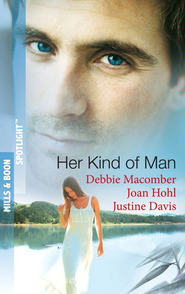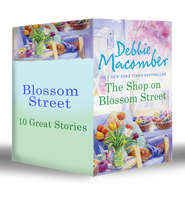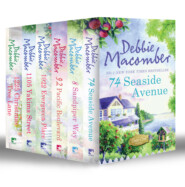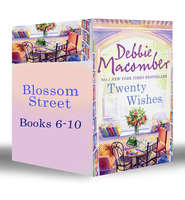По всем вопросам обращайтесь на: info@litportal.ru
(©) 2003-2025.
✖
Dakota Born
Автор
Год написания книги
2019
Настройки чтения
Размер шрифта
Высота строк
Поля
“Sure is.” Lindsay had always liked mornings—even as a teenager. It was a trait she didn’t share with her best friend. Maddy woke up one brain cell at a time, as her mother always said. But she had far more energy in the evenings than Lindsay did. Maybe it was in their genes, she thought, since she was descended from farmers—on her dad’s side, anyway—and Maddy from city folk.
“Will we make Buffalo Valley today?” Maddy asked, finally tossing aside the bedspread and heading toward the bathroom.
“We will if you get a move on.” Her own bags were not only packed but loaded in the car. She’d awakened at six and sat out in the morning sunshine by the motel pool, drinking a first cup of coffee and mulling over the things her grandfather had told her about North Dakota and Buffalo Valley. When he’d arrived in Savannah, he’d been confused and unhappy. In time, he’d adjusted somewhat but it seemed to help to talk about home, and Lindsay had been a willing listener.
Her grandfather had spoken endlessly of fertile land and abundant crops, showed her photographs of a land with a huge expanse of sky above it and fields that stretched to the far horizon. What Lindsay remembered most were his stories of blizzards and his descriptions of the wind. He’d told her more than once that nowhere else in the lower forty-eight states did the wind blow as strong or as fierce as it did in the Dakotas.
He’d said it wasn’t uncommon for the wind to roar at forty miles an hour for a day or longer, and that it could turn soggy ground into dust in a matter of hours. Lindsay didn’t understand what could make a person stay in such a place, but her grandfather had loved his home as intensely as he had his family.
While Maddy dressed, Lindsay studied the maps. By her calculations, they should arrive in Buffalo Valley by late afternoon. From Minneapolis they’d drive toward Fargo, and take Highway 29 to Grand Forks, get onto Highway 2 and go as far as Devils Lake, then head north from there.
As she refolded the maps, she glanced at the telephone.
“Don’t you dare!” Maddy said, framed in the bathroom doorway, the handle of her toothbrush sticking out of her mouth.
“What?”
“You were thinking of calling Monte.”
Lindsay didn’t admit or deny it, but that was exactly what she’d had in mind. Cutting him out of her life was a hundred times more difficult than she’d imagined it would be. He’d been an important part of her everyday life, and she felt lost without him. If it was this difficult now, she could only imagine how much harder it would be once she returned to Savannah.
“You ready to leave?” Maddy asked, as if Lindsay had been the one holding them up.
“Ready.” While Lindsay wore leggings and an oversized T-shirt, Maddy had dressed in a bright yellow shorts outfit that emphasized her long legs and sleek build. They’d often been mistaken for sisters because Lindsay was tall and blond, too.
By eight-thirty they were on the road, music blaring. They sang along—to Janis Joplin, the Stones, early Dylan. Old songs but good ones. And good traveling music.
They ate a late lunch outside Grand Forks, then made their way west to Devils Lake. As far as Lindsay could tell, they were about an hour from Buffalo Valley. The minute they drove north toward her father’s boyhood home, Lindsay grew quiet. All she could see from the road, in either direction, was field after field of wheat, moving with the wind, rippling like waves on the sea.
The temperature had soared; it was close to a hundred degrees, and the Bronco’s air-conditioning system blowing at full speed couldn’t keep the heat completely at bay. Lindsay didn’t mind; in fact, she loved it. Loved the bright intensity of the sun. Loved the sight of wheat fields and this land where her grandparents had forged a good life. She was conscious of gazing upon her own heritage, and with it came a keen sense—an intuition, almost—that North Dakota would help her discover the woman she really was.
“Dad said we should check in with Hassie Knight when we reach town,” Lindsay mentioned. A John Mellencamp CD ended, and they turned off the music.
“Hassie,” Maddy repeated. “What an unusual name.”
Lindsay didn’t remember meeting Hassie, but that wasn’t so odd, since the last time she’d visited Buffalo Valley she’d only been ten. “She runs the town’s pharmacy and is apparently something of an institution,” Lindsay told her. “The pharmacy’s the old-fashioned kind with a soda fountain.”
“I haven’t seen one of those in years,” Maddy said.
“Me, either.” Lindsay’s comment was absentminded, her thoughts suddenly distracted by Monte and their impasse. “Hassie has the key to my grandparents’ house. I told Dad I’d check it out while we’re here.”
They rode in silence, until Maddy said, “You’re thinking about him again, aren’t you?”
Lindsay stared out the window at the wheat fields. “Yes. I’m worried about what’ll happen once I get home. If I was at the store now, he’d be making excuses to come into accounting, chipping away at my resolve, and before I knew it, everything would be back the way it was.”
Maddy sighed. “You’ve heard me say this before, so bear with me. Either you accept the fact that Monte’s never going to marry you and go on as you were or you break off the relationship entirely. I know you have broken up with him, but I also know you want to take him back. Don’t. Because you’ll never get what you need from him.”
“You make it sound so simple,” Lindsay protested.
“It is simple,” Maddy countered, “but that doesn’t mean it’s easy.”
“How can I avoid him?” Lindsay cried out in frustration. “We work in the same place. It’s impossible not to see him every day.” It wasn’t likely her uncle would fire his best salesman over what he considered a lovers’ spat. Nor would she want him to. Still, it made for an uncomfortable situation all around. Naturally she could look for work elsewhere, but she enjoyed her job and there were benefits in working for her uncle that she didn’t want to relinquish.
“That isn’t the real problem though, is it?” Maddy asked.
Briefly Lindsay closed her eyes. “No. I … I’ve broken up with Monte once before—a year and a half ago, remember?—and I’m afraid the same thing’s going to happen again. I told myself it was over and I meant it. I insisted that nothing he could say or do, short of arriving with a wedding license, would make me change my mind.”
“He wore you down then and you’re afraid he’ll do it again.”
Lindsay nodded. Monte had pleaded with her, sent her cards, gifts, flowers, courted her. He wanted to maintain their relationship, but he wanted it on his terms. And he liked things just the way they’d always been. No change and no commitment. No formality and no promises.
“What’s wrong with me, Maddy?” Lindsay wailed. “Am I really so weak?”
“No.” Maddy’s response was emphatic.
“Then why am I stuck in a relationship that makes me this miserable?”
Maddy studied the road. “I’m a social worker, not a counselor, but I’m also your friend. It’s like I said, either you accept what Monte’s willing to offer, or you get out of the relationship. And stay out.”
“I don’t know if I can,” she murmured. Monte had already made it clear. He didn’t intend to lose her, nor would he give her what she wanted. “He genuinely cares about me, and he knows I care for him, too.”
“I realize all that,” Maddy concurred, “but he’s using you. You’re convenient, fun and you love him. He needs that. He needs you.”
“But not enough to marry me and have children with me.” She continually had to remind herself of that. She envied her sisters their families. Whenever she spent time with her nieces and nephews, she came away with a hollow feeling deep inside. A longing for children of her own.
Maddy’s look was sympathetic.
“I’m watching the best years of my life go down the drain,” Lindsay said. “I want children. I really do.” That was the crux of the matter. With her thirtieth birthday fast approaching, Lindsay was beginning to feel a sense of urgency, a desire to anchor her life with a husband and family.
“Well, then, the only way you’ll ever be free of him is to stick to your guns. You’ve broken it off. Don’t change your mind, and don’t let him change it for you.”
They drove in silence for ten or fifteen minutes, each caught up in her own thoughts. The plains continued, mile after mile of flat golden land, with an occasional farmhouse in the distance. Lindsay remembered her grandfather telling her that what he missed most about life on the farm was the solitude. And the silence. It was all the people crowding in around him at the retirement center that had made the adjustment so difficult. She hadn’t really understood what he’d meant until now, as she gazed at these acres of wheat, rippling lightly in the hot wind. They hadn’t seen another car in some time and hadn’t yet seen anyone in the fields.
As they approached Buffalo Valley, Lindsay noted with surprise that the highway didn’t go through town anymore, the way it had in years past. A sign from the main thoroughfare pointed in the direction of Buffalo Valley, which was located off the road. Maddy slowed the car and made the right-hand turn.
Before Lindsay left Savannah, her parents had warned her that Buffalo Valley had changed, but nothing could have prepared her for the shock.
“My goodness,” she whispered as they drove down the main street. There were potholes in the road and the pavement was badly cracked. A number of the stores were boarded up. The large plastic sign for the catalog store was torn, and half of it was missing. The windows were smudged and dirty. The movie theater, with its sign advertising twenty-five cent popcorn, had obviously been vandalized. At the end of the road, the gas station with its old-fashioned rounded pumps looked like it belonged on a postcard from the 1950s. It appeared to be in use; they’d seen another one on their way into town, and that was boarded up.
The most prominent business was Buffalo Bob’s 3 OF A KIND Bar & Grill & Hotel.
“At least there’s a place we can spend the night,” Maddy said with what sounded like relief.
The only brick building in town was the bank, which still seemed to be in operation. The grocery was next to that, and something called the “Old Country Store,” which sold antiques and such. A sign in the window boasted that there wasn’t anything Joshua McKenna couldn’t repair.
“That must be the pharmacy,” Maddy said as she parked the Bronco on the side of the street. Compared to the other businesses, the drugstore looked clean and fresh. Painted white, it stood out like a beacon in the center of town. Two large pots of flowering red geraniums bloomed by the door.
Knight’s Pharmacy was exactly as her dad had recounted, with matching white benches below the large windows. The only thing that had faded was the semicircle of gold lettering on the glass. A large sign propped against the corner of one window read TEACHER WANTED.











